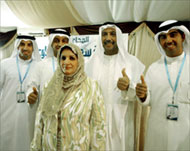Kuwaiti women vote
Kuwaitis braved blistering temperatures to queue up to vote in the first parliamentary ballot involving women in the northern Gulf state.

“I couldn’t sleep last night,” voter Taiba Sadeq told Aljazeera.net on Thursday.
“I was thinking so much about who I should vote for. It’s such a big responsibility for us women in particular, to make this election different from all the others, as now we, too, can vote.”
Polling stations closed at 8 pm (1700 GMT), 12 hours after voting began. Counting of votes, which is manual, was expected to start soon.
Turnout was expected to be high, with polling stations in the nation’s capital, Kuwait City, surrounded by large crowds of voters and supporters of the various candidates.
“We are expecting about a 70% turnout,” said Masad al-Mahan in the affluent Mirqab constituency.
“This is despite the hot weather. Most people see this as a key election, a real challenge to the government.”
Temperatures hit 47C (116F) on Thursday.
‘Amazing’ turnout
The ballot was called by the emir, Sheikh Sabah al-Ahmad Al Sabah, after he dissolved parliament ahead of schedule last month.
|
“Most people see this as a key election, a real challenge to the government” Masad al-Mahan, Kuwaiti voter |
The chamber had become deadlocked on the key issue of electoral reform and had challenged the ruling Al Sabah family by proposing to cross-examine Sheikh Nasser al-Mohammed Al Sabah, the prime minister and the emir’s nephew.
“There’s been an amazing turnout,” said Sheikha Nouf Al Sabah in Mirqab. A member of the 2,000-strong ruling Al Sabah family, she supports the liberal, reformist candidate, Abdulwahab al-Haroun.
The election has seen some tough campaigning in the country’s 25 constituencies, which will elect 50 members of parliament. Another 15 are appointed by the emir.
Twenty-eight women are running as candidates, with about 340,000 votes to be cast.
Corruption claims
Meanwhile, there have been allegations of vote buying and intimidation of women candidates.
 |
|
Some Kuwaitis are keen for |
“There is major corruption here,” businessman Sayed al-Bakhri said at the downtown Sharq district.
“Everyone knows this. They are offering to buy votes, to make presents, to give contracts – the government, too.”
Others say such allegations are unproven.
“There’s never any real evidence given, just allegations,” said campaigner Hamad al-Haroun in Mirqab.
“Besides, it’s hard to see how vote buying could work, given that the ballot is secret and there are very strict rules on this now,” he added.
Growing criticism
The campaign has been characterised by increasingly strident criticism of the government and the ruling family.
|
“Not only will it be good for Arab women to see women do well here, but also for all those who want change here” Sayed al-Bakhri, Kuwaiti voter |
“Why should the prime minister have to be a royal?” said Khalil al-Baghdi at the more mixed constituency of Mishrif.
“And why should the foreign minister and the defence minister and the health minister and all the rest of them be royals too?”
The ruling Al Sabah family has long secured the top ministerial posts for its members.
Results are due to start coming two to three hours after the ballot stations close at 8pm local time on Thursday.
“There’s a lot of criticism going on, but at least here we can do that,” al-Bakri said.
“It’s important for other states, too, to see what happens, as not only will it be good for Arab women to see women do well here, but also for all those who want change here.”